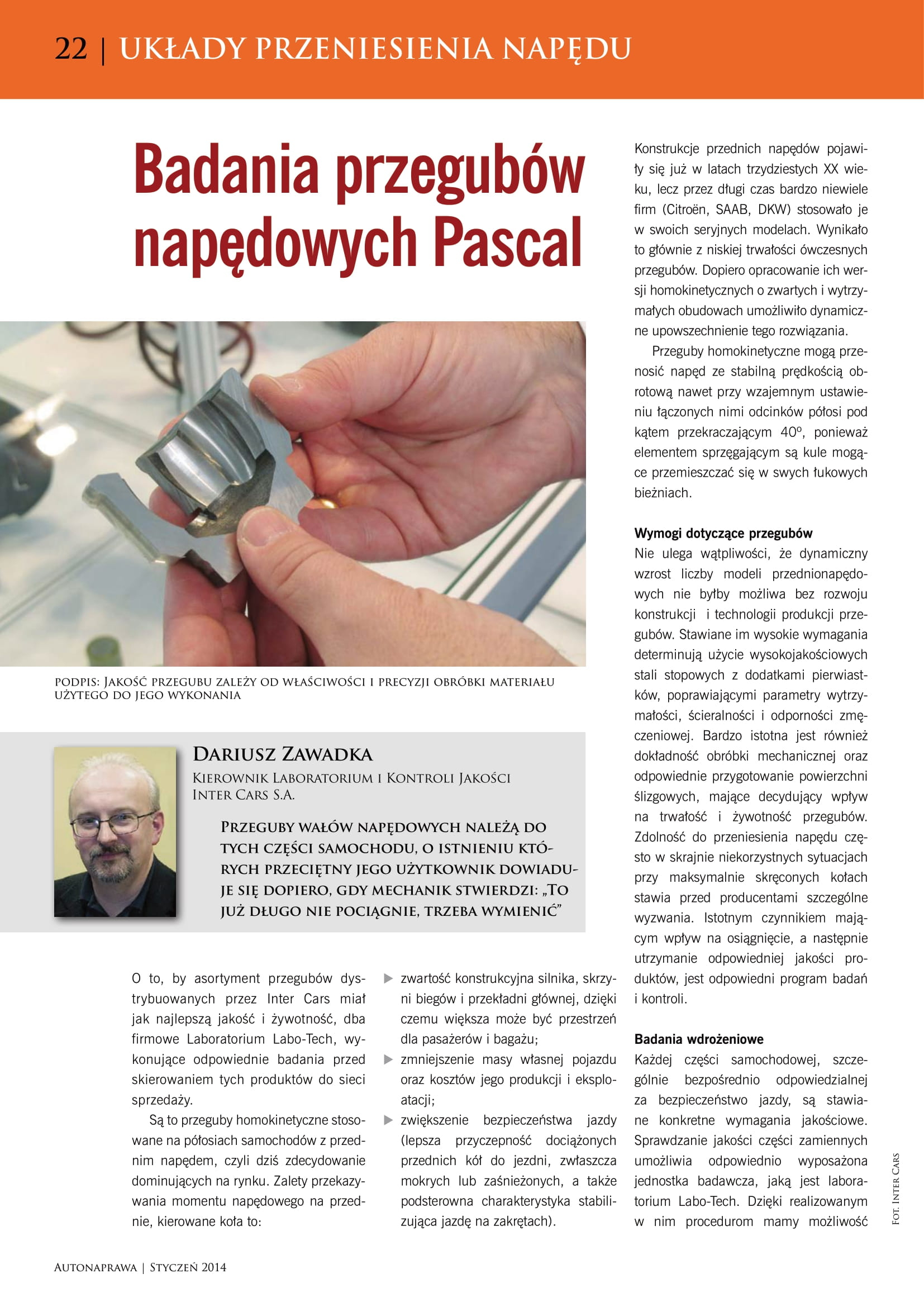
CV joints full examination
Pascal drives joint tests
For the assortment of joints distributed by Inter Cars to have the best possible quality and durability, cares the company’s Labo-Tech Laboratory, performing relevant tests before directing these products to the network sale.
These are constant velocity joints used on driveshafts of front-wheel drive cars, which is definitely today dominant in the market. The advantages of transferring drive torque to the front steered wheels are:
– structural compactness of the engine, gearbox and final drive, thanks how much space can there be for passengers and luggage;
– reduction of the curb weight of the vehicle and the costs of its production and operation;
– increasing driving safety (Better weighted grip front wheels to the road, especially wet or snowy as well understeer characteristics to stabilize cornering).
Front-wheel drive designs appeared as early as the 1930s, but for a long time very few companies (Citroën, SAAB, DKW) used them in their series models. This is mainly due to the low durability of those times joints. Only the development of their homokinetic versions with compact and durable housings made it possible to dynamically disseminate this solution.
Constant velocity joints can transfer the drive with a stable rotational speed even when the half-axle segments connected by them are mutually aligned under an angle exceeding 40º because the coupling element are balls that can move in their arcs treadmills.
Joint requirements
No doubt it’s dynamic the increase in the number of front-wheel drive models would not have been possible without development construction and production technology of joints. High demands are placed on them determine the use of high-quality alloy steels with additions of elements, improving the parameters of strength, abrasion and fatigue resistance. It is also very important machining accuracy and proper surface preparation sliding, having a decisive influence on the durability and service life of the joints.
The ability to transfer power often in extremely unfavorable situations with the wheels turned to the maximum puts special demands on producers challenges. An important factor in the achievement, then to maintain the appropriate quality of products, there is an appropriate research program and control.
Implementation studies
Every car part, especially the one directly responsible for driving safety, there are specific quality requirements. Checking the quality of spare parts is adequately equipped research unit, which is the Labo-Tech laboratory.
Thanks to implemented procedures, we can carry out implementation tests drive joints, i.e. fixing their actual technical parameters. As a result of the research, we determine the type material used and its processing and the accuracy of fitting individual elements of the joint. The first stage of this research is checking the geometric dimensions of a given component to ensure that the functional parameters are fulfilled. We also find out if the dimensions of the joint are in accordance with the required tolerances. Thanks to this we have certainty that the manufacturer meets the assumptions our technical requirements. Then the joint is dismantled on components (housing, basket inner, balls, inner body), and then, after cleaning from grease, cut for laboratory samples. The next step is to test the roughness of the raceway balls both those located on in the joint housing as well as in the body internal joint. The distribution of the lubricant that reduces the friction of the balls depends on the roughness of the raceway, which is directly related to durability joint.
Next, it checks hardness of individual elements. It must fit within the specified limits compartments. Too big is not recommended, as it may lead to premature wear of mating parts. This study also provides information about quality of heat treatment of the material. The latest study that we can check the quality of the material used to produce the joint, there is a test its internal structure. For this purpose cut elements of the joint included they are in special resin and after proper it is possible to prepare the smear evaluation and metallographic analysis of the sample.
Thanks to this test, we get an answer whether the manufacturer used the right material and whether it subjected it to the appropriate heat treatment processes. The conducted research is archived, thanks to which we can monitor the quality of deliveries over weeks, months and years. We have created an efficient one supplier qualification system based on own research. Thanks to this, we constantly monitor the quality of products. Videos, photos from research, e.g. joints can be seen on our website www.labo-tech.eu.


